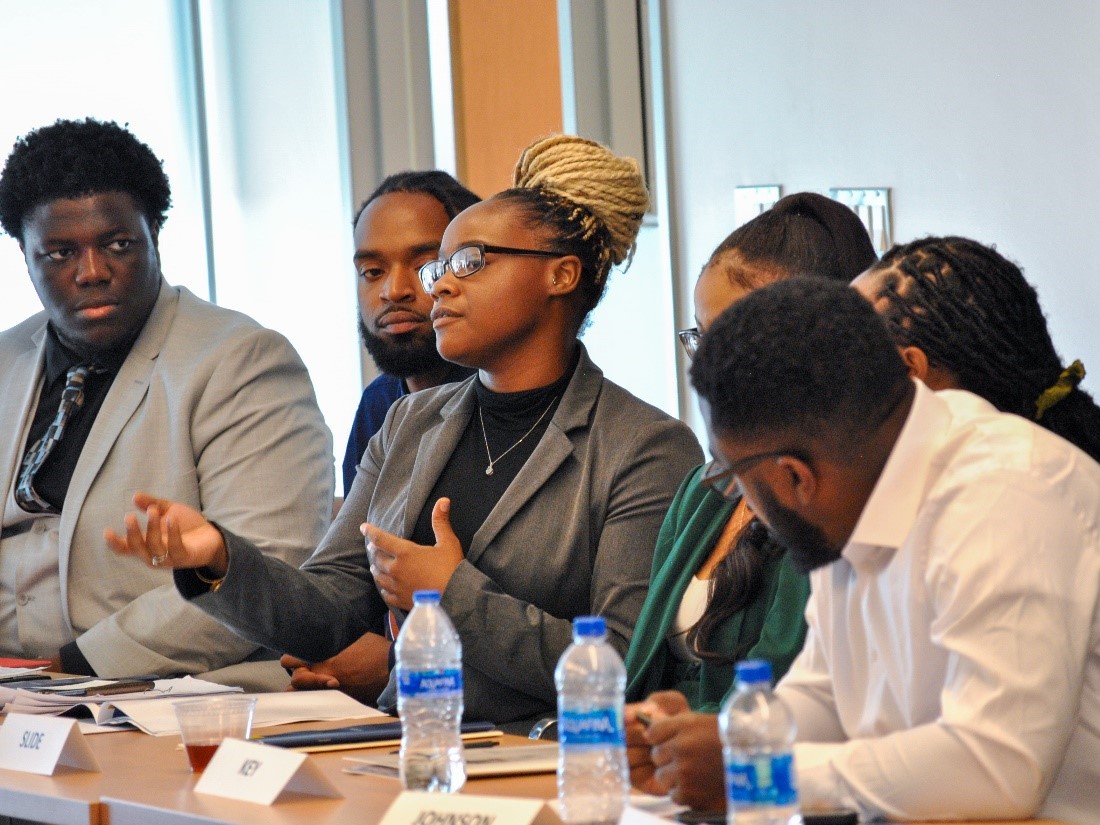|
February 17, 2024 Reaching the Next Generation in Policing
PERF Members, “I don’t feel like I truly valued or respected police like I do now. Seeing behind the scenes and how they interact with the community has really shown me a different image than what I had, and what I feel like people generally or my friends have. . . . I’m glad that I was able to shift that perspective. . . .” Jayla Hall, an Alabama A&M student who recently interned at the Minneapolis Police Department through the PERF-HBCU (Historically Black Colleges and Universities) Summer Internship Program, shared these words about her experiences in the program.
Jayla Hall (Photo credit: ShelettaMakesMeLaugh.com) This Tuesday, PERF will release its report, “Immersing College Students in Police Agencies Can Improve Recruitment and Community Trust: Lessons from the PERF-HBCU Summer Internship Program.” I know many, if not most, of your departments have some version of an internship or cadet program. It is not a new idea, in policing or elsewhere, to engage young people in the hopes of bringing them into your organization later. We designed this internship program to focus on the potential impacts of immersing college students, particularly those attending HBCUs, in police departments. We wanted to help departments establish formal connections with these colleges and universities to design and implement meaningful internship opportunities that would appeal to the various student bodies – including those without prior exposure to policing. And we wanted to see if this model could build bridges between communities and policing by letting the students and the officers see each other beyond stereotypes and media narratives. PERF started this internship program in 2022, as police departments across the country were facing heightened concerns around trust in many minority communities, increased strains around staffing, and persistent negative media stories about the very nature of policing and those working in it (all issues still facing the profession today). During discussions with then-Baltimore Police Commissioner and PERF Board President Mike Harrison that summer, an idea emerged. Baltimore is home to two HBCUs – Coppin State University and Morgan State University – yet few of those students become Baltimore police officers. How could we reach those students? Could we structure an internship program that would build connections that might change perspectives and potentially bring some of those students into the profession? Over the next two years, the PERF-HBCU internship program answered those questions and taught us much more.
The 2022 class of interns discuss their experiences in the program during their final capstone presentation ceremony PERF worked with 29 departments, 13 HBCUs, and 38 students over two summers to develop and test this model to see if it was part of a solution. The report details why the answer is a resounding, YES! The report gives police leaders a playbook for creating and operating quality, college-level internship programs in their departments. Some of the key elements identified in designing a high-value internship model were:
While it is not possible for every department to hire multiple interns, we found that connecting the students as a cohort so they could learn from each other and begin to build professional networks was an added and crucial element of this program. It also allowed us to bring the entire group to national PERF meetings. Even if you do not have a cohort in your department, seriously consider allowing them to see how policing is discussed by bringing them to some of these national convenings.
Members of the 2023 class of interns at the PERF annual meeting in New York City While partnering with the HBCUs was an essential element of this project, it isn’t the only way to help ensure your internship program recruits from a diverse pool. If you do not have an HBCU near you, you may have a national university with students from across the country, a Hispanic-Serving Institution (HSI), or a network of community colleges. Yes, internships have costs, especially if they are paid (as they should be). But those costs are powerful investments in the future of policing. Many departments are giving hiring and retention bonuses of $25,000 or more to address staffing constraints. Investing in young people should be a part of any sustainable strategy for addressing staffing and other challenges, beyond expensive quick fixes, like bonuses, and short-term recruitment drives. This is what I call “going upstream” in the recruiting process. It is worth noting that one former PERF-HBCU intern has already been hired by the Baltimore Police Department, and many others say they intend to pursue a career in policing after graduating. Policing needs to focus on reaching more young people like those we were lucky to have in this cohort. Each of them was filled with creativity, a passion for service, and the empathy and understanding that is needed to build trust in communities across this country. Immanuel Martin, a student at Howard University here in Washington D.C., who interned at the Prince George’s County PD, succinctly summarized why this model was so effective: “I really had to look inside and say, ‘If I really want to make a change in my own community, if I want to see a change in how the world views law enforcement, I have to get in it. I can’t just criticize it from the outside.” With young people like this interested in it, I feel more confident every day about the future of this noble profession. Best, Chuck |



